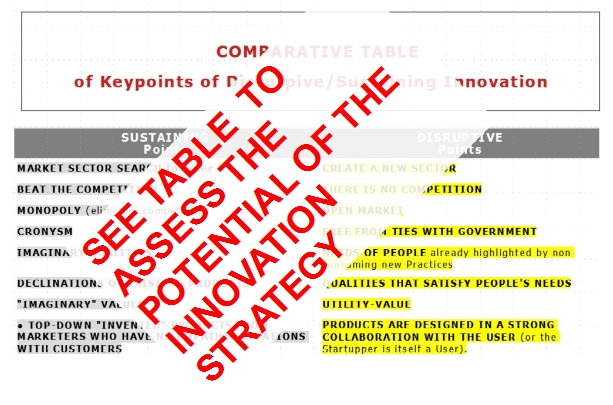
1) Startups that today put the Incumbents in difficulty – the established Business in the sector –
DO NOT ENTER IN COMPETITION WITH CON BIG COMPANIES,
but take away from them the Customers
OFFERING COMPLETELY NEW PRODUCT TYPOLOGIES
that meet the needs of the Customers much better than big companies would like to satisfy with their products (for example, Airbnb is putting the Hotels in crisis without entering the Hotel sector).
.
2) The new Startups can develop winning strategies towards the established Business since the activation of disruptive business provides:
► VERY LOW INVESTMENTS:
○ the new products are based on already “mature” technologies, the consumer technologies with the cost of a few dollars (and have more than enough performance to develop the satisfaction of the needs of the new Demand).
<see Not disruptive technologies, but disruptive concept (enabling technologies) >
○ Even the new, radically new production methods do not require large investments.
<see Industry 4.0: the Smart manufacturing (& SmartFAB) >
► QUICK STARTUPPING: the way product design, production and distribution are very quick to implement (even when it comes to Hardware products: today it is possible, for example, practicing the way of Proximity production, which allows you to pass “files” to small local workshops).
<see Not disruptive technologies, but disruptive concept (enabling technologies) >
3) SUCCESSFUL STARTUPPERS TODAY HOLD THE TRADITIONAL ROLE OF BUSINESS THAT HAS WORKED FOR MILLENNIA (which has been abandoned in the last few decades, from the Manager “), that of the Entrepreneur. Which in addition to being the activator of the business, is also a Customer (or, at least, is able to perceive the needs of the Customers, since it is in contact with their problems).
<see The Entrepreneur’s DNA >
<see Decalogue of Rulesof Disruptive innovation >
.
In other words, successful Startups that develop disrutpive innovation, among other things, do not need to:
– obtain large investments
– develop complex industrial plans
– carry out complex market research (based on intuition)


